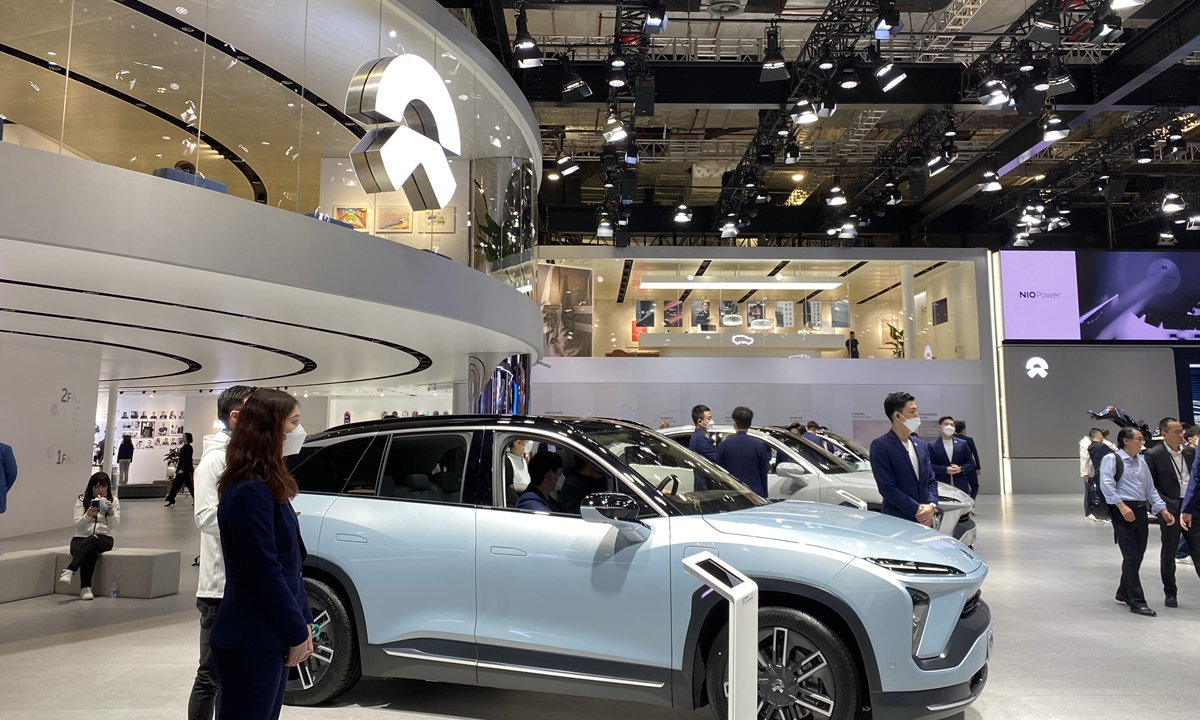
The Nio booth at the 19th International Automobile Industry Exhibition (Auto Shanghai 2021) on Tuesday Photo: Xie Jun/GT
Chinese electric vehicle (EV) maker Nio is making a final dash to sell cars in Europe, with the cars to be sold having already passed the EU's verification process, and a local management team will be set up in the third quarter, one of Nio's top executives told the Global Times on the sidelines of the 19th International Automobile Industry Exhibition (Auto Shanghai 2021) on Tuesday.
The Shanghai-based EV manufacturer is joining a fleet of Chinese new-energy vehicle (NEV) start-ups that have taken action to explore the huge yet competitive overseas markets, a trend that experts view with both optimism and caution.
Some said that Chinese NEV start-ups have technological advantages to back their going out but also face an arduous task to enhance brand awareness abroad.
Qin Lihong, President of Nio, said that the company is currently forming its management team in Europe, with about one-third of the team - including the general manager - already in place. By the third quarter of this year, chances are great that the team will be complete.
Other preparations are also in full swing. Qin said that Nio has started building its after-sale service center and a data center in Europe. All the cars have passed the EU's verification and are waiting to be shipped. Nio's first batch of power swap stations for Europe will also be transported soon, Qin said.
According to Qin, chances are great that Nio cars will be priced higher than Audi cars on average in Europe. He didn't reveal which cars will be sold in Europe or the exact date for sales to start, but said that the information will be disclosed soon.
Independent car analyst Wu Shuocheng said that he believes the company is trying to achieve high-end brand positioning. According to him, many car companies have tried to conquer overseas markets by pricing their cars cheaply at first and then launching higher-ranking vehicles, but the impression among consumers is not easy to change once they see a brand as a low-end one.
Apart from Europe, Nio is also planning to enter the US, although at a later stage. "US car verification standards are different from those of Europe or China, so we need to redevelop our car models to enter the US, which we have no energy to do now as a start-up, but we will do it later," Qin said.
Nio is not alone among Chinese NEV start-ups that have ambitions to ship their cars overseas. Last year, Xpeng delivered the first batch of 100 G3 cars to Norway. In November, WM signed an intentional agreement with Uber to export its cars to Europe.
However, challenges remain for such exploration. For one thing, Chinese companies are often elbowed out of overseas markets due to protectionism. For another, it's not easy for Chinese car companies to develop visibility in markets where overseas car brands already have lasting footholds.
"It would be a difficult task for Chinese NEV companies to sell cars to overseas markets because they don't reach a scale in domestic markets that can support them to sell abroad, the way that overseas brands like Volkswagen once did decades ago," Zhang Xiang, a research fellow at Research Center of Automobile Industry Innovation under North China University of Technology, told the Global Times.
He noted that Chinese car companies have to set up relevant sales and maintenance networks in overseas markets, which would raise costs for them. This would in turn prolong their profitability cycle and would be a challenging model.
Wu said that chances of Chinese NEV cars winning overseas markets are better than gas-powered cars. But that does not mean that Chinese NEVs have an overwhelming advantage in overseas markets, as their brand influence still lags behind traditional automakers or EV brands like Tesla.




